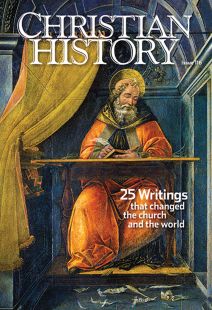Westminster Confession of Faith [#20]
GENERATIONS OF CHILDREN have grown up with the memorable beginning of the Westminster Catechism: “What is the chief end of man? To glorify God, and enjoy him forever.”
Order Christian History #116: Twenty-Five Writings that Changed the Church and the World in print.
Subscribe now to get future print issues in your mailbox (donation requested but not required).
But this statement arose from strife. In 1643 Parliament authorized the calling of an “Assembly of Divines” to bring English Protestantism more in line with the rest of Europe, including Presbyterian Scotland. By the time the theologians actually met, civil war had broken out. Some Anglican bishops did not attend due to loyalty to the king. Meanwhile the Scottish church sent delegates, making the assembly predominantly Presbyterian. It abolished bishops and the Book of Common Prayer (BCP), and in 1646 (the same year the king was defeated) drew up the Westminster Confession.
In 1660 the monarchy returned to power, bringing bishops and the BCP back with it. Clergy who refused to conform were kicked out of Anglicanism, forming “dissenting” denominations. In 1689 the king gave up trying to force bishops on the Scots. The Confession became the foundation of Scottish religion, its catechisms taught to every schoolchild.
The Confession sees Scripture as foundational:
“The whole counsel of God concerning all things necessary for His own glory, man’s salvation, faith and life, is either expressly set down in Scripture, or . . . may be deduced from Scripture: unto which nothing at any time is to be added, whether by new revelations of the Spirit, or traditions of men.” Yet it also admits that some practical matters of liturgy and church government may be resolved by “the light of nature and Christian prudence.”
The Confession also argues that God ordains whatever happens without either being the “author of evil” or taking away free will, and has “predestinated” some people to everlasting life and “foreordained” others to everlasting death. Good works are the inevitable fruit of justification but not in any sense the basis for our acceptance by God. It also affirms Calvin’s view that believers truly and spiritually feed on the body and blood of Christ in the Eucharist and proclaims that the church is both “invisible” (all the elect, ultimately known only to God) and “visible” (where the Word is preached and the sacraments properly administered).
The Confession failed to unify British Protestantism, but it had a deep impact on faith and culture. And even to those like myself who don’t subscribe to confessional Calvinism, its majestic sentences ring in the mind like a bell.
This article is from Christian History magazine #116 Twenty-Five Writings that Changed the Church and the World. Read it in context here!
By Edwin Woodruff Tait
[Christian History originally published this article in Christian History Issue #116 in 2015]
Next articles
Solid, scriptural, rational
The Book of Common Prayer [#12] set forth a liturgy that lasted
Jennifer Woodruff TaitNot concerning the heart but the life
Jonathan Edwards’s Treatise [#23] and John Wesley’s Plain Account [#22] spoke of holiness
William Kostlevy




